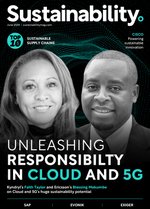Building Long-Term Resilience into Sustainability Strategy

As sustainability becomes increasingly integrated into long-term planning for many businesses, leaders are now asking slightly different questions when building strategy. As well as what can be done for each other and the planet, the question is – what can sustainability do for us, and how can we ensure that developments put in place today stand the test of time?
In other words – how can Chief Sustainability Officers build resiliency into their sustainability strategy?
Sorouch Kheradmand is Global Head of Sustainability, Vice President at Schneider Electric, celebrated by Sustainability Magazine as the world’s most sustainable company. He believes that businesses are at a crucial point with strategy and should take advantage of using sustainability to build long term value.
“We’ve reached a point where all the stars are starting to align. Green policy is ramping up, digital energy solutions are becoming more widely available and there is increasing evidence that sustainability isn’t just an environmental concern, but also an economic and business opportunity – for those who will be part of the transformation and for future resilience,” he says.
“A recent report found that economies across the world are due to have an average income loss of 19% by 2049 due to past emissions, which equates to a 17% reduction in global GDP. In a strained global economy, businesses need to harness the competitive benefits of sustainability to future-proof their operations.”
Pier Vittorio Rebba, Global Head of Sustainability Business, Digital Energy Industries at ABB thinks that, as the world transforms due to climate change, businesses are presented with the opportunity to engage in new efficiencies.
“The planet is heating up and we are seeing population growth, geographical and economic instability, water scarcity and more” he says. “We’re still working out what this environmental transition means and we need to manage it in the most effective way possible Alongside sustainability initiatives, it is prompting changes in technology and the workforce, and industry leaders need to work out the balance between growth and net zero because both are possible.”
Green financing is here for the long run
The world’s biggest companies are investing in green energy, electrification and efficiency boosters. The biggest green deal ever – at an incredible US$10bn – was recently signed by tech giant Microsoft in partnership with Brookfield Renewable Partners.
While moves like that are likely to contribute to sustainability goals and support global cooling, they are also clever financial moves that build long term resilience into these companies.
“Investments in decarbonisation technologies like energy management software, energy-efficient electrical equipment and microgrids are growing,” Sorouch explains.
“In addition, green financing is to grow by 21% per year by 2033. This shows where investments will flow in the next decade, and it’s up to us to support that transition and do so in a way that is benefiting our industry and business ecosystem.”
ABB partners with customers to avoid emissions and ramp up renewables, with its scalable program, Mission to Zero, covering energy generation, energy management and building automation for industrial and commercial operations.
“I believe the most important thing is to be able to set the proper priorities. We are trying to help our customers to make plans much more efficiently and are proposing solutions,” Pier adds.
“ABB is already involved in hydrogen power, new fuels and carbon capture, with a lot of plants all of which are moving towards greater efficiency.”
Developing technology – sustainably
AI is the ever-developing tool in the proverbial shed that seems to have uses in every industry, and ML and cloud technologies have become crucial to daily life for many. As these technologies are developing and becoming integrated into workflows, it is essential that sustainability is not just considered, but prioritised. By ensuring that technology is running as energy-efficiently as possible – and has as little environmental impact as possible – leaders build resilience into them.
As regulations develop and reporting becomes stricter, companies can’t just look to the current requirements if they want to stand the test of time. The most successful companies – not just in sustainability – are the ones staying at least one step ahead.
“We have to quickly become able to do more with less and to manage the complexities through next-gen people in new roles, using AI and other technologies,” explains Pier.
“Data is incredibly important: data coming from the machinery inside the plants and from the surrounding market, price data, environmental data for meteorological forecasts and much more. We need to be able to catch and interpret all this data, clean it and apply an algorithm on top of it.”
How can companies build long-term resilience into sustainability strategy?
“Collaboration between organisations, suppliers and customers is crucial in helping each party build resilience and reduce their overall impact in line with Scope 1, 2 and 3 emissions,” believes Sorouch.
“Partnering for sustainability involves taking action to decarbonise your operations, as well as empowering your customers with the tools and knowledge to decarbonise their operations. This means adopting the role of sustainability consultants to partners and suppliers that are on their own journey to decarbonise. The right partnerships can simplify and accelerate not just your own sustainability journey, but our collective journey to net zero.”
Schneider Electric celebrates its partnerships with pride, backed by its belief that sustainability is a journey best embarked on together.
“For companies big and small, anticipating what's coming can help create more business opportunities,” he concludes.
“This means creating a roadmap with attainable targets so that sustainability is being consciously embedded into the business’s strategy to maximise competitive advantage and outcomes.”
******
Make sure you check out the latest edition of Sustainability Magazine and also sign up to our global conference series - Sustainability LIVE 2024
******
Sustainability Magazine is a BizClik brand

